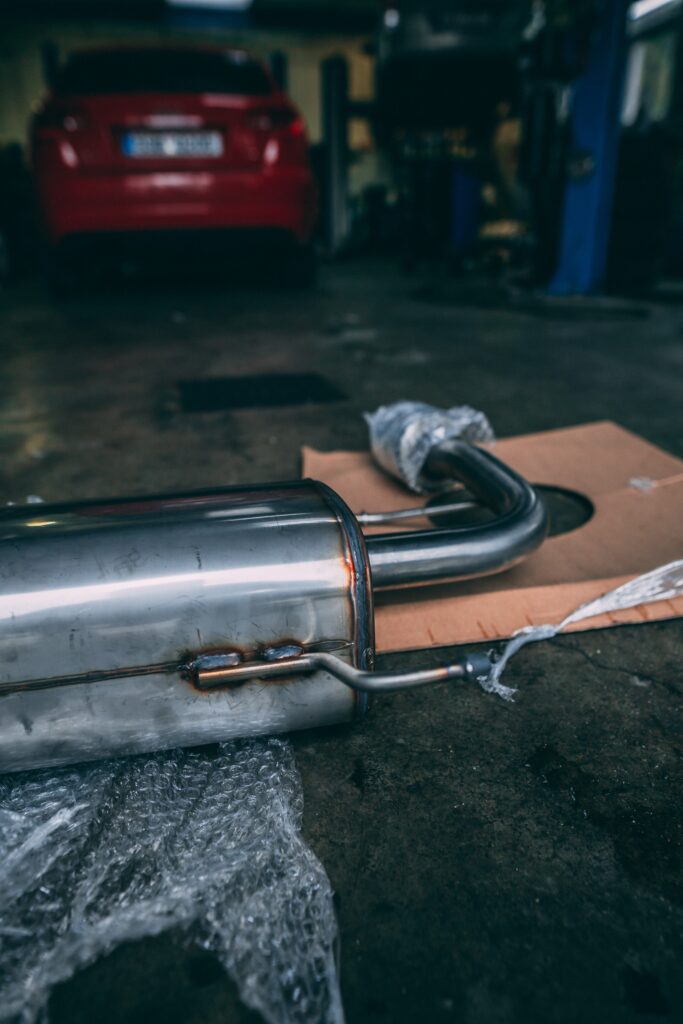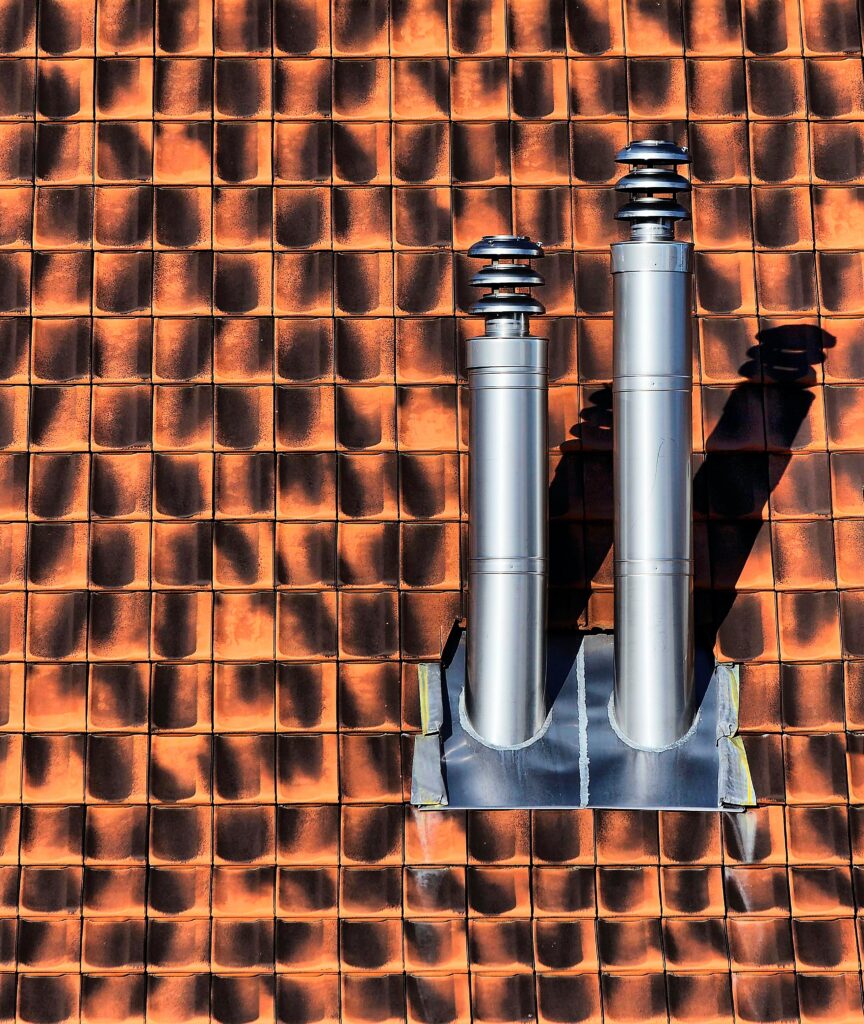Have you ever noticed that your car’s exhaust system has started to make more noise than usual? Whether it’s a loud rumbling sound or a high-pitched squeal, a noisy exhaust system can be a cause for concern. But what exactly causes this increase in noise over time? In this article, we will explore some of the common reasons behind a noisy exhaust system and provide some tips on how to address these issues. So, if you’ve been wondering why your car’s exhaust is sounding louder than ever, keep reading to find out more.

Understanding the Exhaust System
The exhaust system plays a vital role in the overall performance of your vehicle. It is responsible for safely and efficiently removing the harmful gases produced during the combustion process. But do you really understand how this system works? Let’s take a closer look.
Basic Function of the Exhaust System
The basic function of the exhaust system is to guide The exhaust gases from the engine to the tailpipe, where they are expelled into the atmosphere. By doing so, it helps maintain the optimal performance of the engine by ensuring the smooth flow of air and fuel into the combustion chambers. Additionally, the exhaust system also reduces noise and controls emissions, making it an essential component for any vehicle.
Components Constituting the Exhaust System
To fully comprehend how the exhaust system works, it’s important to understand the different components that make it up. The major components of an exhaust system include the manifold, catalytic converter, muffler, resonator, exhaust pipes, and exhaust mounts.
The exhaust manifold connects the engine’s exhaust ports to the rest of the exhaust system. It collects the gases from each cylinder and directs them into the exhaust pipe. From there, the gases pass through the catalytic converter, which helps reduce harmful emissions.
The muffler and resonator are responsible for reducing the noise produced by the exhaust gases. The muffler consists of chambers that allow the gas to expand and cool down, while the resonator helps cancel out unwanted sound frequencies.
The exhaust pipes are used to transport the gases from one component to another. They are designed to withstand high temperatures and are usually made of stainless steel or aluminized steel. Finally, the exhaust mounts secure the exhaust system in place, ensuring it stays connected to the vehicle’s chassis.
Role of Exhaust System in Vehicle’s Performance
Apart from its primary function of expelling exhaust gases, the exhaust system also plays a crucial role in the overall performance of your vehicle. A well-functioning exhaust system helps maintain the engine’s efficiency by promoting proper air and fuel flow. It also contributes to fuel economy, as any restrictions in the system can lead to increased backpressure, reducing engine power and wasting fuel.
Furthermore, a properly functioning exhaust system ensures compliance with environmental regulations by controlling emissions. This is particularly important as stricter emission standards are being implemented worldwide. By reducing harmful gases and pollutants, the exhaust system helps minimize the impact of your vehicle on the environment.
General Wear and Tear
Over time, various factors can contribute to the wear and tear of your exhaust system. Understanding these factors can help you identify potential issues and take appropriate measures to prevent further damage.
Impact of Heat on Exhaust System Components
One of the main factors that can cause wear and tear on the exhaust system is heat. The exhaust system operates at high temperatures due to the combustion process, and this constant exposure to heat can cause components to degrade over time.
The exhaust manifold, for example, is directly exposed to the intense heat generated by the engine. This constant exposure can lead to the manifold warping or cracking, which can result in exhaust leaks and increased noise. Similarly, the heat can also cause the catalytic converter to deteriorate, reducing its effectiveness in controlling emissions.
Effect of Road Conditions on Exhaust System
Another factor that can contribute to the wear and tear of your exhaust system is the condition of the roads you frequently drive on. Rough roads, potholes, and speed bumps can subject the exhaust system to excessive vibrations and impacts, leading to damage.
The resonator and muffler, being located at the rear of the vehicle, are particularly vulnerable to damage from road debris and impacts. The constant exposure to these conditions can lead to dents and holes in these components, resulting in increased noise levels.
Exhaust Leaks
Exhaust leaks are a common cause of a noisy exhaust system. Understanding how these leaks develop and their connection to the noise can help you address the issue effectively.
How Exhaust Leaks Develop
Exhaust leaks occur when there are gaps or openings in the exhaust system that allow the gases to escape before reaching the tailpipe. These leaks can develop due to a variety of reasons, including corrosion, loose connections, or damage caused by road debris.
Over time, the high temperatures and constant exposure to moisture can cause the exhaust pipes or other components to rust or corrode. This corrosion can weaken the integrity of the system, leading to gaps or holes that allow the gases to leak.
Loose connections between the different components of the exhaust system can also result in leaks. The constant vibrations and movements of the vehicle can cause these connections to become loose, allowing gases to escape.
Link between Exhaust Leaks and Noisy Exhaust System
Exhaust leaks are often associated with a noisy exhaust system. When gases leak before reaching the muffler and resonator, the sound waves are not properly dampened, resulting in a louder exhaust noise.
The location and severity of the leak can also impact the noise levels. Leaks closer to the engine, such as those in the exhaust manifold, can produce a loud, ticking or tapping noise. On the other hand, leaks at the rear of the exhaust system, such as in the muffler or tailpipe, can result in a deep, rumbling sound.
It’s important to address exhaust leaks promptly, as they not only increase the noise level but can also pose a risk to your health. The gases leaking from the exhaust system contain carbon monoxide, which is a deadly gas if inhaled in high concentrations.
Hole in the Muffler
A hole or damage in the muffler is another common cause of a noisy exhaust system. Let’s dig deeper into the causes of muffler damage and how it can increase noise levels.
Causes of Muffler Damage
The muffler, being one of the most exposed components of the exhaust system, is prone to damage. The main causes of muffler damage include the impact of road conditions, corrosion, and physical damage.
As mentioned earlier, rough roads, potholes, and speed bumps can subject the muffler to excessive vibrations and impacts. Over time, this can lead to dents and holes in the muffler, compromising its ability to dampen sound waves effectively.
Corrosion is another common cause of muffler damage. Moisture, road salt, and other environmental factors can cause the muffler to rust or corrode, weakening its structure. Eventually, this corrosion can result in holes or leaks, resulting in increased exhaust noise.
Physical damage, such as collisions or accidents, can also cause significant damage to the muffler. In such cases, the muffler may develop cracks, holes, or even detach from the exhaust system, leading to a noticeable increase in noise.
How Muffler Damage Increases Noise
The muffler is designed to reduce noise by directing and altering sound waves. Its internal chambers enable the expansion and cooling of the exhaust gases, which helps dampen the noise produced during the combustion process.
When the muffler is damaged, such as having holes or dents, its ability to alter sound waves is compromised. Sound waves escape through these openings without being properly dampened, resulting in an increase in noise levels. This can be especially noticeable during acceleration or when the engine is running at higher RPMs.
It’s crucial to address muffler damage promptly to not only restore a quieter exhaust system but also to avoid potential legal issues. Many jurisdictions have regulations regarding the maximum allowable noise levels for vehicles, and driving with a damaged muffler can result in fines or penalties.

Rusted Exhaust Pipes
Rusted exhaust pipes are another common culprit behind a noisy exhaust system. Let’s explore the reasons for exhaust pipe rusting and its correlation with increased noise.
Reasons for Exhaust Pipe Rusting
Exhaust pipes are constantly exposed to high temperatures, moisture, and environmental elements. The combination of heat and moisture can cause the pipes to rust or corrode over time.
Road salt, which is commonly used during winter to melt ice, can accelerate the rusting process. The salt, when in contact with the exhaust pipes, can cause corrosion and eventually lead to holes or weak spots.
Additionally, the quality and thickness of the exhaust pipes play a significant role in their durability. Low-quality materials or thin pipes are more prone to rusting and damage, as they do not have the necessary strength to withstand the harsh conditions.
Correlation between Rusted Pipes and Increased Noise
When the exhaust pipes rust or develop weak spots, it can result in holes or gaps in the system. These openings allow the gases to escape before reaching the muffler and resonator, resulting in increased noise.
Rusted pipes can also cause vibrations and rattling sounds as they become loose or separated from other components. The constant movement and exposure to the elements intensify the corrosion, making the noise even more pronounced.
It’s essential to regularly inspect your exhaust pipes for signs of rust or damage. Catching and addressing the issue early can prevent further deterioration and minimize the noise level of your exhaust system.
Broken or Loose Exhaust Mounts
Broken or loose exhaust mounts are another factor that can contribute to a noisy exhaust system. Understanding the possible causes for exhaust mount damage and how they create noise is crucial in resolving the issue effectively.
Possible Causes for Exhaust Mount Damage
Exhaust mounts, as the name suggests, are the components that secure the exhaust system in place and provide stability. The constant vibrations, movements, and exposure to high temperatures can cause these mounts to deteriorate or fail over time.
One of the main causes of exhaust mount damage is plastic degradation. Many vehicles use rubber or plastic mounts, which can deteriorate due to exposure to heat and environmental elements. As the mounts degrade, they can become weak and lose their ability to secure the exhaust system firmly.
Collisions or accidents can also cause damage to exhaust mounts. The impact of these incidents can lead to bent or broken mounts, resulting in an unstable exhaust system.
Noise Creation by Damaged Exhaust Mounts
When the exhaust mounts are broken or loose, the exhaust system becomes unstable. This instability allows the components to vibrate and move more freely, creating noise.
Vibrations and rattling sounds are common symptoms of damaged exhaust mounts. The noise is often more noticeable during idle or when the vehicle is in motion over uneven surfaces. The severity of the noise can also increase as the damage to the mounts worsens.
Addressing damaged exhaust mounts promptly is essential not only to reduce noise but also to prevent further damage to the exhaust system. Unstable mounts can put stress on the other components, leading to premature wear and potentially costly repairs.

Damaged Resonator
The resonator is another component of the exhaust system that can contribute to noise when damaged. Let’s delve into what a resonator is and how damage to it can lead to increased noise.
What is a Resonator
The resonator is a component designed to cancel out or reduce specific sound frequencies in the exhaust system. It works by creating sound waves that are out of phase with the undesirable frequencies produced during the combustion process.
While the muffler focuses on reducing overall noise levels, the resonator targets specific frequencies that are known to cause resonance or harsh sounds. By effectively canceling these frequencies, the resonator helps create a smoother and less noisy exhaust note.
How Resonator Damage Leads to Noise
Like other components of the exhaust system, the resonator is susceptible to damage over time. The constant exposure to heat, moisture, and road conditions can cause the resonator to develop cracks, holes, or other forms of damage.
When the resonator is damaged, its ability to cancel out specific frequencies is compromised. As a result, the unwanted sound frequencies are no longer adequately diminished, leading to an increase in noise levels.
The noise produced due to resonator damage can range from a deep, rumbling sound to a high-pitched, metallic noise. The severity of the noise depends on the location and extent of the damage, as well as the specific resonant frequencies affected.
Repairing or replacing a damaged resonator is crucial to restore the proper functionality of the exhaust system and reduce noise. A skilled mechanic can evaluate the extent of the damage and recommend the best course of action.
Fixing a Noisy Exhaust System
When faced with a noisy exhaust system, you have options to address the issue. Whether you prefer professional assistance or a do-it-yourself approach, there are solutions available for you.
Professional Mechanic Solutions
Visiting a professional mechanic is often the best option when dealing with a noisy exhaust system. Mechanics have the expertise and specialized tools to diagnose and repair the issue effectively.
A skilled mechanic will thoroughly inspect your exhaust system to identify the source of the noise. They will check for exhaust leaks, damaged components, and other potential causes of increased noise. Once the issue is pinpointed, they will proceed with the necessary repairs or replacements.
The professional solution may involve fixing or replacing damaged components, such as mufflers, resonators, or pipes. In some cases, the entire exhaust system may need to be replaced to ensure optimal performance and noise reduction.
Do-It-Yourself Solutions
For those who prefer taking matters into their own hands, there are do-it-yourself solutions available as well. However, it’s important to note that DIY repairs are best suited for minor issues, and more complex problems should be left to professionals.
One common DIY solution for a noisy exhaust system is patching small holes or leaks using exhaust repair kits. These kits typically contain materials like heat-resistant tape, epoxy, or sealants, which can temporarily seal the gaps and reduce noise.
Another DIY solution is replacing damaged mounts, as they are relatively straightforward to remove and replace. However, it’s crucial to ensure you have the necessary tools and knowledge to safely perform the repair.
It’s important to remember that DIY repairs should only be attempted if you have the necessary skills and equipment. Improper repairs can lead to further damage, increased noise, or even safety hazards. If you are unsure or uncomfortable with performing the repairs yourself, it’s always best to seek professional assistance.
In conclusion, understanding the various factors that contribute to a noisy exhaust system is key to addressing the issue effectively. By familiarizing yourself with the basic function of the exhaust system, the components involved, and the potential causes of increased noise, you can take appropriate measures to maintain a quieter and well-functioning exhaust system. Whether you opt for professional assistance or a DIY approach, addressing the issue promptly will not only reduce noise but also ensure the optimal performance of your vehicle.
